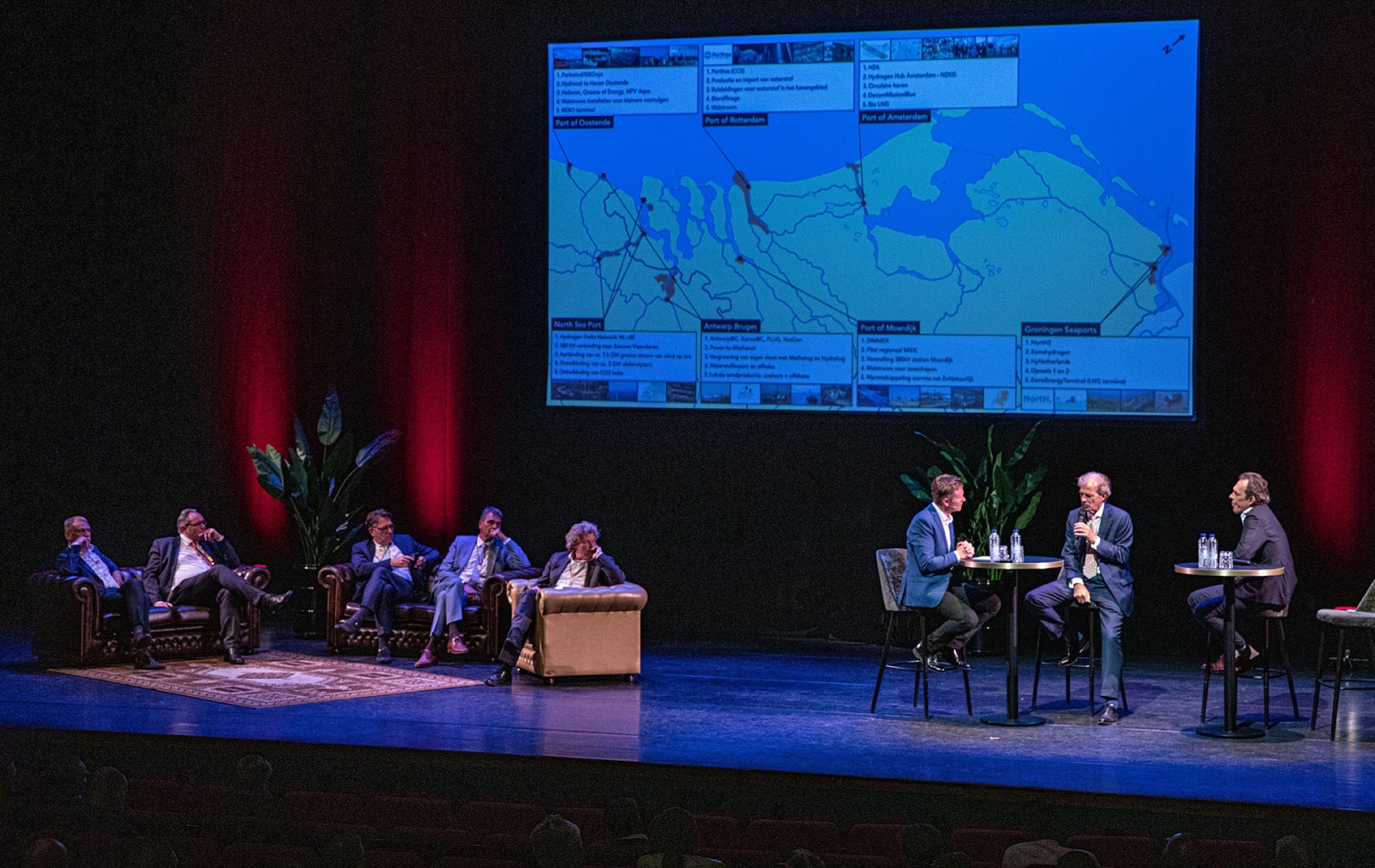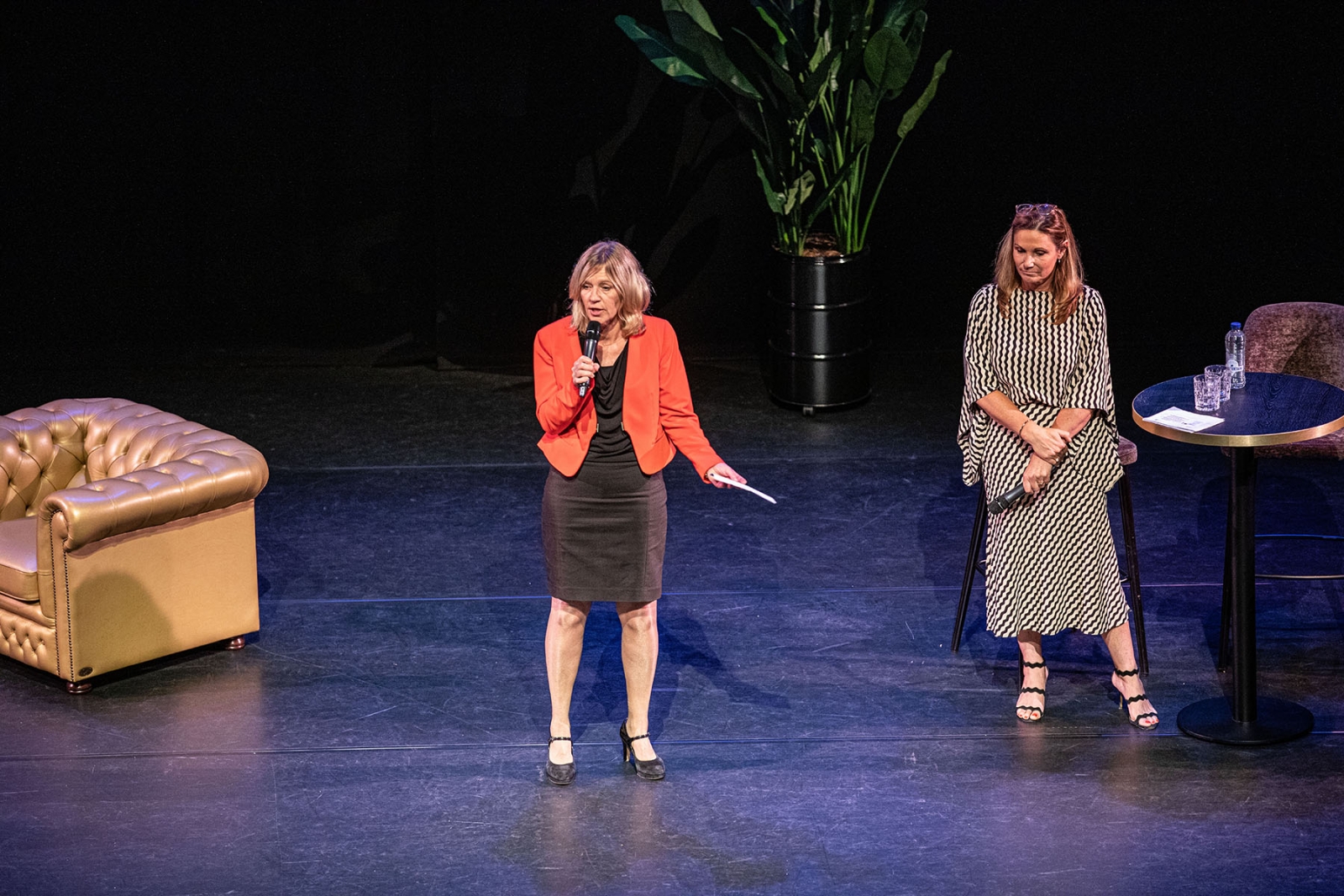Circular Ports
Circular Ports
Topics
Circular Port Monitor
Explore this topic
Delta Atelier
Explore this topic
Vlaams-Nederlandse Havendag 2022 dominated by the energy crisis
Tuesday 16 August 2022
The Port of Rotterdam hosted the conference “De Vlaams-Nederlandse Havendag 2022” and brought together the fine fleur of the Flemish and Dutch port authorities along with important industrial companies that manage infrastructure and logistical services.
CEO Allard Castelein of the Port of Rotterdam welcomed the participants to the New Luxor Theatre with a clear warning: “If companies do not want to collaborate with us toward a green transition, they will, in time, no longer be welcome in the port complex.” Castelein underlined the ambition of the Rotterdam port to reduce CO2 emissions 55% by 2030 and become carbon neutral by 2050.
Hydrogen
What became quickly clear is that the conference would be dominated by the challenges of the energy transition and energy security. And even if Professor Elvira Haezendonck (VUB) warned “It’s not only about hydrogen”, most of the conference was dominated by references to hydrogen playing a dominant in any new energy system. Allard Castelein stated that Northwestern Europe would always need to import energy, because the region simply does not have the capacity to generate enough by itself.
This was later echoed by Bart Biebuyck of Hydrogen Valley Europe. He stated that the strategy of the EU is focused on the production of 10 million tons of hydrogen per year along with the import of 10 million tons of hydrogen per year. Biebuyck shared another interesting fact that made clear the enormity of that challenge: To produce these 10 million tons of hydrogen, one needs 5 times the electricity consumption of the Netherlands. Biebuyck further pleaded to create what he calls a “Hydrogen Valley” in the Flemish-Dutch delta, an integrated industrial cluster with a high concentration of infrastructure, production, and clients for hydrogen. “Because any transition towards a hydrogen economy will start in the ports: they are the hubs for imports, transport to the hinterland, production also. The whole coordination lies with the ports”, said Biebuyck.
“Because any transition towards a hydrogen economy will start in the ports: they are the hubs for imports, transport to the hinterland, production also. The whole coordination lies with the ports”

Daan Schalck of North Sea Port underlined the strategic importance of hydrogen: it allows for the storage of offshore wind energy and can act as a stabilizer in the energy market. Schalck was also quick to add that once you create hydrogen with green electricity, it makes little sense to turn that hydrogen into electricity again later. Rather, it should be used in industry and transport as a power source and fuel.
It’s the infrastructure, stupid!
CEO Allard Castelein made the case for removing the barriers for building infrastructure to realise the energy transition. He seemed to say: create a robust, interconnected new infrastructure for transport and trade of electricity, hydrogen and other molecules, and we will make the energy transition a guaranteed success. Professor Elvira Haezendonck of VUB agreed with the fact that the creation of new infrastructure has a strong “Pull-effect” and attracts new activity almost automatically.
Will we be able to build the backbone in time?
CEO Chris Peeters of ELIA, that manages the electricity grid in Belgium, underlined the time we waste with new infrastructure projects: “If it takes only 2 to 3 years to build, it often takes 15 years to get the necessary permits. That’s a big problem.” Case in point is the Ventilusproject in Flanders, the new grid connection needed to bring new offshore capacity on land. Studies show it is best to keep the line above the ground but protest groups demand an underground solution.
“If it takes only 2 to 3 years to build, it often takes 15 years to get the necessary permits. That’s a big problem.”
The pressure on the existing infrastructure is already huge. “Especially now with the war in Ukraine, electrification goes a lot faster. Companies suddenly find a better business case for their electrification project and demand from us the infrastructure”, said Manon van Beek, CEO of TenneT. “More often than not the capacity these companies need doubles or triples.”
Manon van Beek appealed to everybody to “Think 2045” and “Start Big” when it comes to infrastructure. In her mind the scale goes beyond the needs of Flanders and the Netherlands. “With Denmark and Germany, we need to create the interconnected platform for the rapid exchange of electrons and logistics.”
The question of collaboration
“We are already way passed the question ‘why’ and are all concerned with the question ‘How’”, said host Allard Castelein.
“The challenges before us are of an immense complexity”, offered Jacques Vandermeiren, CEO Port of Antwerp Bruges. “We need a completely new system. Essential in that regard is that some questions are answered on a policy level.” For instance, The EU should address the question: what is green hydrogen exactly? Once these standards are known, ports and businesses can get to work. “On a more local level we need to create the value chain for the new products”, said Vandermeiren.
The CEO of the Port of Rotterdam sees two import phases for the transition. “In a first phase we must weave together the different, new value chains that are coming into existence. We must start matching imports, production, end customers and clients”, said Castelein. “In a second phase things like price, volumes, timing, and synergies will start to settle. We can’t do everything at once. It doesn’t make sense to all start to work together from the very beginning. Collaboration is not a goal in itself, but a means towards other goals.”
The question of collaboration remained though. Because who, for instance, needs to direct the construction of the backbone? On what scale does it need to happen? Professor Larissa van der Lugt, director of the Erasmus Centre for Urban, Port and Transport Economics, retorted that “Collaboration is indeed not a goal in itself but essential in systems change. A framework is necessary. It creates the favourable conditions for the new investment that are needed.”
CEO Koen Overtoom of the Port of Amsterdam agreed: “A masterplan for infrastructure is necessary for investment and to give everybody more certainty.”
“Collaboration is indeed not a goal in itself but essential in systems change. A framework is necessary. It creates the favourable conditions for the new investment that are needed.”
What about circularity?
Amid a European energy crisis, it was to be expected that the energy transition took up most of the attention during the conference. It also meant that the transition towards a circular economy received much less time for discussion. In fact, apart from lip service, little concrete was announced by the port CEO’s in that regard.

The exception was Daan Schalck of North Sea Port who reiterated the importance of that challenge. Strategically Europe has a huge advantage on that front, said Schalck. “We are sitting on top of vast resources like scrap metal, for instance. While the whole world is scrambling to find primary materials, we have them here already. We should learn how to reuse these materials and hence become less dependent on other parts of the world."
"We are sitting on top of vast resources like scrap metal"
Creating a circular economy is hard and very complex. During the energy transition much will be learned that can help it along. Maybe Elvira Haezendonck was right when she stated that there is no natural fit between the present business model of ports and the principles of a circular economy.

| Publication date | 16/08/2022 |
| Categories | News |
| Authors | Floris Van Cauwelaert |
.png)